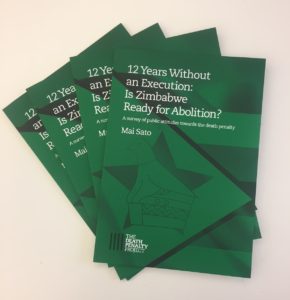
New opinion study shows Zimbabwean public ready to accept death penalty abolition
- News
- 22 May 2018
Today, The Death Penalty Project, in partnership with Veritas, launches “12 Years Without an Execution: Is Zimbabwe Ready for Abolition?” a national public opinion study, providing for the first time comprehensive and contextualised data on public attitudes towards the death penalty in Zimbabwe – a country that has not carried out any executions in over 12 years.
The death penalty has been a contentious issue in Zimbabwe. In his previous position as Vice President, President Emmerson Mnangagwa has been vocal in support of abolition – a position that varied from that of Robert Mugabe. There has been some positive progress towards abolition; in 2013 the new constitution abolished the mandatory death penalty and exempted women, amongst others, from capital punishment. However, even though Zimbabwe has not executed anyone in a long time, the death penalty remains a lawful punishment and prisoners continue to be sentenced to death.
To investigate the views of the public towards the death penalty, a nationally representative survey was carried out with 1,200 Zimbabweans. The research was undertaken by Dr Mai Sato, University of Reading, in association with the University of Zimbabwe. Amongst other key questions, respondents were asked about their knowledge of the death penalty, whether they think Zimbabwe should move towards abolition and how they rank the death penalty when compared with other criminal justice policies.
There are three main conclusions to be drawn from the findings:-
- Support for the death penalty is relatively low
- 61% of Zimbabweans supported retention of the death penalty (41% thought it should ‘definitely’ be kept and 20% that it should ‘probably’ be kept)
- When confronted with a range of typical case scenarios, a majority of Zimbabweans rejected imposing the death penalty in five out of six cases
While a majority of Zimbabweans expressed support for the death penalty this is much lower than may be expected for a country that retains the death penalty. Comparatively, a survey conducted in Trinidad in 2011 revealed that 89% of the public were in favour of keeping the death penalty. Moreover, the reluctance of Zimbabweans to impose the death penalty in different cases where the sentence could typically be applied suggests that support for capital punishment may be much lower in practice.
- Support for the death penalty is not entrenched
- 92% of Zimbabweans considered policies other than ‘more executions’ to be the most effective at reducing violent crime
- 80% of those Zimbabweans who expressed support for the death penalty would be willing to accept abolition if it were to become government policy
The findings suggest that the death penalty is not an issue that Zimbabweans feel particularly strongly about and, if the government were to abolish, this decision would be widely accepted.
- Public knowledge about the death penalty is limited
- 83% were unaware that Zimbabwe has not carried out any executions in the past decade
- 45% did not know that the method of execution in Zimbabwe is hanging
Respondents were generally poorly informed about the use of the death penalty in Zimbabwe and their opinions were therefore based on incomplete knowledge of the issue.
The research provides critical data to assist Zimbabwean policymakers – in particular those who may wish to move away from capital punishment but are faced with the dilemma of apparently strong public support for the death penalty.
Dr Mai Sato, University of Reading and report author, says:
“The report focuses on moving public opinion beyond a binary issue of abolition or retention of the death penalty and unpicked how Zimbabweans really think about the topic.
Some of the most compelling findings in the report are around how many Zimbabweans hadn’t realised that the country hasn’t carried out any executions in more than 12 years. Equally, more than nine in ten people we asked felt that alternatives to the death penalty would be most effective in reducing violent crime in their country.”
Parvais Jabbar, Co-Executive Director of The Death Penalty Project, says:
“This illuminating research comes at an important time for Zimbabwe. President Emmerson Mnangagwa has in the past publically called for abolition of the death penalty. The findings should serve to assure policymakers that public opinion is not a barrier to abolition in Zimbabwe. We hope it will further encourage all governments of countries that retain the death penalty to question their assumptions on public attitudes.”
Watch this short video presenting some of the key findings:-
Notes to Editors
The Death Penalty Project, in partnership with Zimbabwean NGO Veritas, commissioned Dr Mai Sato, University of Reading, to carry out this research. The fieldwork was conducted by independent research organisation the Mass Public Opinion Institute. The research is supported by the University of Zimbabwe. The study was made possible by a grant received from the UK Foreign and Commonwealth Office.
Read the report Mai Sato (2018) 12 Years Without an Execution: Is Zimbabwe Ready for Abolition?




















